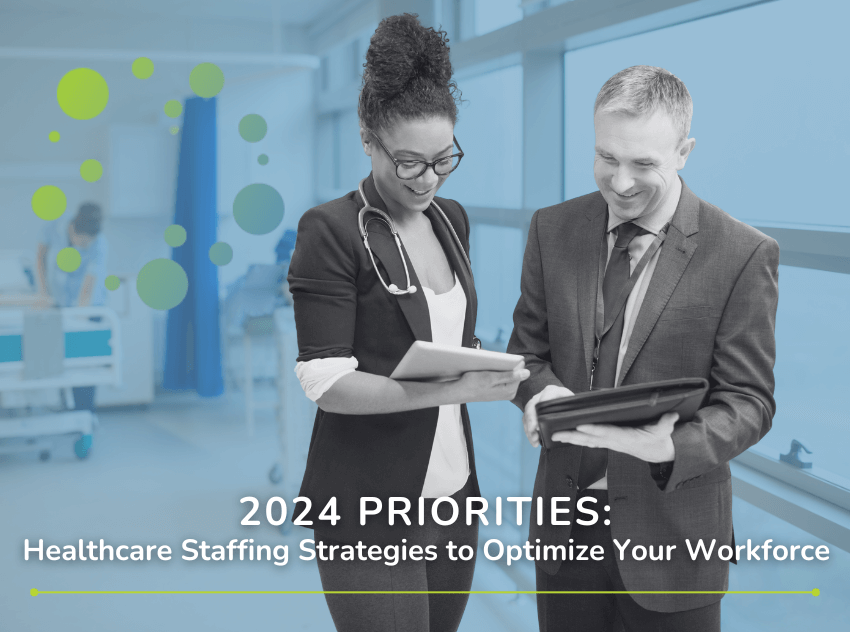Do you know what to expect in healthcare staffing for 2024 and beyond? As we look to the future, it’s important to see where we’ve been to properly prepare. Without taking a strategic look ahead, your healthcare facility risks further clinician shortages due to overworked clinicians, burnout, and a lack of a talent pipeline—which can lead to reduced patient care and higher costs for the hospital.
Mitigating staffing shortages requires careful planning. Understanding how to prioritize and plan will ultimately improve patient care, your organization’s resilience, and the efficacy of your health system. Taking a proactive approach to developing strategies will help you remain financially stable without compromising patient care or costs.
Priority #1: Stabilize Your Workforce
Stabilizing your workforce can be done by utilizing local and per diem staff to supplement your core nursing staff. This diversity in recruitment brings different perspectives and even cultural competencies to patient care and addresses the evolving needs of both patients and clinicians.
Workforce stabilization also requires getting to the root of staff turnover. This may look like assessing the talent pipeline in your facility as well as addressing the reality of clinician burnout and mental health needs brought on by excessive use of overtime hours.
More and more health systems are utilizing academic partnerships to build a talent pipeline. This means partnering with higher education facilities and high schools to develop programs allowing clinicians to enter the healthcare workforce immediately.
Your local and per diem staff can help alleviate the overtime hours that your core nursing staff are facing, drastically. This is the first step in combating clinician burnout, and the next step is looking at what other programs you can adopt in your facility, such as new overtime protocols and initiatives to address clinician mental health and wellness.
Priority #2: Clinician Mental Health and Wellness
In November 2023, The American Nurses Foundation published its fourth annual survey of nurse wellness that indicated 56% of the 7,400+ nurses who responded were experiencing burnout. Mental health and wellness continue to be vitally important and a top priority for clinicians, which means it needs to be a priority for hospitals and health systems too.
Code Lavender, the rapid-response protocol, was developed to address the psychological and emotional well-being of healthcare staff during prolonged emotional distress and even acute stress. The protocol offers immediate resources and support to help hospital staff alleviate burnout and enhance their quality of life. By helping staff care for themselves, they can better care for their patients.
Priority #3: Control Costs
Rather than relying solely on full-time staff and incurring overtime costs during periods of high demand, hospitals can use local and per diem staff to meet their short-term staffing needs. This is a more cost-effective approach, and one of the ways that utilizing local and per diem contracts helps health systems control costs.
Local and per diem staff can also help you with cost control by minimizing the cost of training and benefits. When you work with the right workforce solutions partner, such as Matchwell, your local and per diem staff are familiar with your hospital’s procedures and receive benefits from their W2 status with their agency, meaning they are already equipped with their health insurance and other benefits that would otherwise cause your facility to incur additional costs.
Planning is crucial for healthcare staffing in 2024 and beyond. Neglecting the priorities that we’ve outlined above can lead to further clinician shortages, burnout, and financial strain. With Matchwell’s collaboration, you can proactively ensure optimal patient care, clinician well-being, and financial stability.
Matchwell, now part of the Medical Solutions healthcare talent ecosystem, is an agency alternative that matches clinicians with top healthcare facilities looking for local and per diem talent. Start a conversation today!

